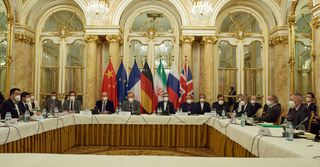Former US president Barack Obama never submitted his 2015 Iran nuclear deal to the senate for ratification as a treaty. Had he done so, it would have been rejected. A majority of senators opposed the agreement, known as the Joint Comprehensive Plan of Action, or JCPOA. The public frowned on it, too. A Pew poll that fall found that only one in five of those surveyed backed the treaty.
Almost from the outset, Iran had violated several of the restrictions imposed by the deal. It hid information from international inspectors. It test-fired a nuclear-capable ballistic missile and declared it would accept no limitations on its missile development. Obama had pitched the deal as one that would encourage Iran to “get right with the world”, but that never came close to happening. The Islamic Republic intervened in Syria’s civil war in support of the murderous Bashar al-Assad, armed Houthi rebels in Yemen, seized two US navy vessels and humiliated their sailors, called repeatedly for the extermination of Israel, and continued to subsidise terrorist groups.
Despite that record, Joe Biden ran for president on a pledge to revive Obama’s nuclear agreement, from which the US withdrew when Donald Trump was in the White House. For months, the Biden administration has been negotiating in Vienna to strike a deal with Iran, and latest reports suggested that a return to the JCPOA was imminent.
No longer.
The Wall Street Journal recently revealed that Russia, which has been a key player in the Vienna talks, was conditioning its support for a new nuclear deal on the creation of a loophole in the economic sanctions imposed by the west. Russia is demanding a written guarantee that its trade with Iran will be exempted from sanctions if the JCPOA is resurrected. But that would undermine the international financial squeeze being applied to Russia. That is a concession the Biden administration refuses to make, even to clinch an Iran deal. Meanwhile, Iran has issued a fresh reminder that it remains committed to spreading terrorism and violence across the Middle East.
On March 13, Iran fired a barrage of missiles into northern Iraq, striking near the US consulate site in Erbil. This was a deliberate violation of Iraqi sovereignty and an act of aggression against the US. Writing in The Jerusalem Post, Seth J. Frantzman observed that the consulate is not in the centre of the city, which meant that the consulate had to be specifically targeted. Tehran readily took credit for that attack. Its Islamic Revolutionary Guard Corps said it was meant as a message to Israel.
All this comes as participants in the Vienna negotiations have been warning that the new deal in the works would amount to a capitulation by the US. According to former state department official Gabriel Noronha, the Biden administration agreed “to lift sanctions on some of the regime’s worst terrorists and torturers”. Unable to condone such concessions, Noronha wrote on Twitter, three members of the US team chose to leave.
The response on Capitol Hill to these developments has been a rising tide of opposition to a new Iran deal. A bipartisan group of representatives wrote to the White House with a long list of concerns and questions about the proposed new agreement. Their bottom line was polite but blunt: “It is hard to envision supporting an agreement along the lines being publicly discussed.”
If Russia’s attempted extortion was not enough to put the Iran deal on the ropes, Iran’s recent missile attack should certainly have done so. If those do not do it, the rising tide of congressional opposition ought to. The first Iran deal was a disaster and the second was shaping up to be another. The JCPOA has been dead since 2018. It is in the world’s best interest that it stay that way.
The author is a politically conservative American journalist.



